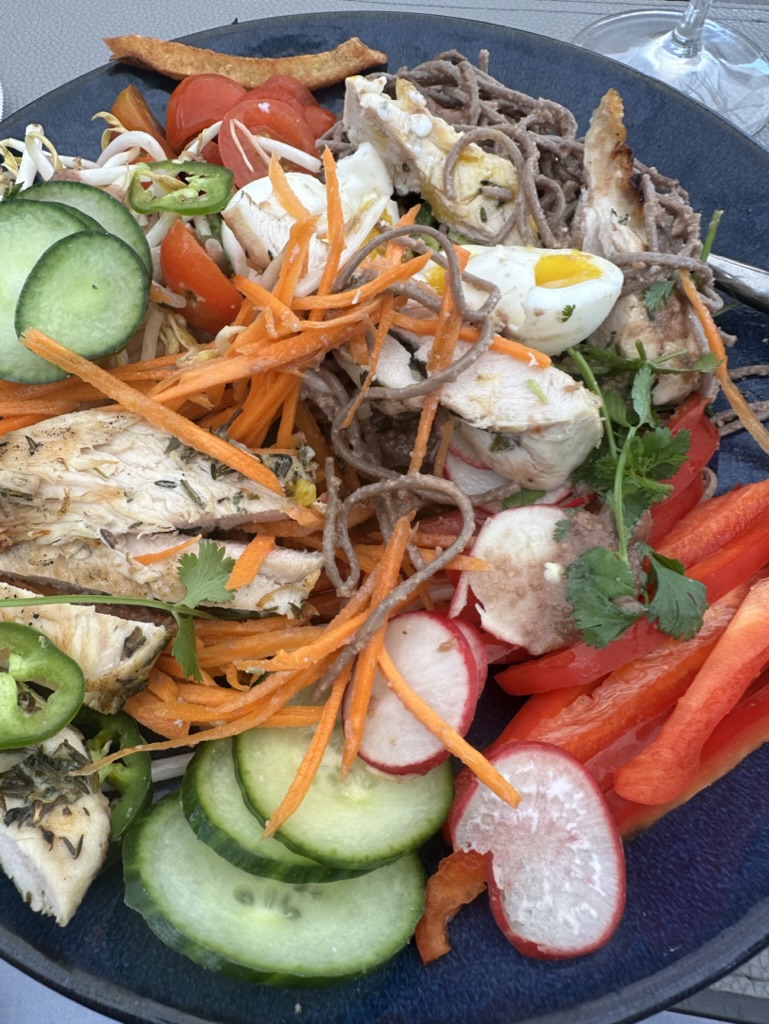
There are ways to research what are the most-asked questions for Google, divided into categories.
When I look for the most popular question for menopause or post-menopause, do you have a guess what the topic of the question is?
How to lose weight.
Our bodies change during and after menopause. Our body must adjust to a sharp decline in hormone production. The effect of going through menopause has a sharper change when compared to the change we go through in puberty. Our body composition shifts. If we don’t make changes to our diet and exercise we will lose lean muscle mass. To compensate, we have to make adjustments if we want our bodies to stay familiar.
The systems and ways of managing our health must change as we grow older and wiser.
Some women say menopause, or postmenopause, caused changes to their body without changing the diet they have always eaten. They notice a larger mid-section, a pooching belly that they didn’t used to have. And some women notice that they can’t seem to take this extra pooch off their belly.
There is some question still whether menopause is the cause of mid-section weight gain. The menopause doctors I reference, below, find a connection and think menopause is a definite cause of “menopause belly” or an extra “belly pooch” that doesn’t want to go away with conventional weight loss techniques. For more, see your doctor or health care provider (if they know a thing or two about menopause…).
It used to be that in order to lose weight, we were told it was simple, right? Just eat less. Exercise more. Way more! We needed a calorie restriction, a calorie deficit: eat less calories by cutting out the amount and quantity of your daily diet. And if that wasn’t working you just weren’t trying hard enough. You must not have good discipline if you can’t get the extra weight off (ouch).
Also we were instructed to do more with high-intensity training, HIIT training. That we should push ourselves into getting our heart pounding and do a lot of that to lose weight. More cardio! Do it harder and faster!

After menopause (postmenopause) 2 medical doctors I turn to for advice (they are both board-certified in nutrition besides being MDs, one is an OB/GYN specializing in menopause, linked down below) both say those are NOT the weight-loss guidelines that work for women in menopause or postmenopause. According to these and several other MDs and menopause websites the tools we should use for losing weight are:
- Exercising moderately (for example: brisk walking) building up slowly to 150+ minutes per week, ideally outside for fresh air and sunshine therapy
- Lifting weights (starting light and building up slowly to heavy weights) 2 – 3 times per week, find a certified personal trainer to help you start
- Reducing stress (using mindset, journaling, meditation, breathing, set up healthy boundaries, make time for fun, find your purpose, put yourself first so you are available to help others)
- Prioritizing sleep: find a sleep hygiene routine to increase your time sleeping (7 – 9 hours per night: try getting morning sunshine, exercising, darkening your room, keeping the room cool at about 65 degrees, using a sound machine to distract from external noise, practice a calming and predictable routine pre-bedtime… journaling, reading, mediation before a consistent bedtime, ) tailored to your personal needs
- Eating at least 25 grams of fiber (nuts, seeds, beans, legumes, vegetables, fruit with skin, whole grains), using a supplement on days when you don’t consume enough) becomes more important with aging
- Eating an anti-inflammatory diet rich with color and variety with nourishing whole foods (rather than ultra-processed foods)
- Eating less than 25 grams of added sugar per day (look at labels), any sugar (white or natural) is inflammatory and creates cravings for more sugar
- Reducing or eliminating alcohol (to help with sleep, stress, and decrease inflammation)
- Increasing protein: 1 gram per pound of your ideal weight is the goal: protein keeps your appetite satisfied, gives you energy, and is anti-inflammatory (beans, legumes, lean animal protein, fatty fish)
- Practice Intermittent fasting it helps ease digestion and controls inflammation: a popular formula is 16:8 (fasting 16 hours, eating in the remaining 8 hour window in the day). Delay breakfast until 16 hours have passed since you last ate dinner the day before. Eating earlier in the day and allowing hours to pass between your dinner and bedtime will also make sleeping easier. There are other formulas to try until you find what suits you best. Start slow!
- Eating mindfully, taking note of how you feel when you eat certain foods, or the best time for you to eat breakfast or dinner, what foods cause you to feel better? Pay attention so you can adjust your diet to your personal needs
- Check with your health care team, watch your health metrics, get your recommended tests and screenings for optimal health
- Food is medicine and worth your time and effort to eat well for your overall health and longevity
Not only will this shift in diet help with reducing fat, it will also create a vibrancy and overall feelings of well-being thanks to improved mental health, gut health, clarity, mood and energy.
Here is to your health and making the most of your precious days1
PS: Links to recommended websites
Comments +